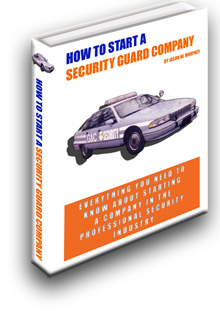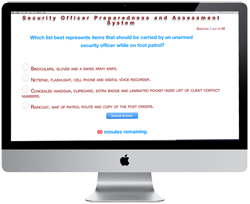 Practice Test
Training
Regulations
Security FAQs
Member Support
Sign In
Join
Practice Test
Training
Regulations
Security FAQs
Member Support
Sign In
Join

LAST EDIT June 8, 2018
This article is based on Chapter Three of How to Start a Security Guard Company ebook. The book includes 140 pages of must-have advice for private security entrepreneurs, a sample security agency business plan and a resource directory for cutting costs. To read more, you may purchase the paperback from Amazon or download a free PDF of the book from The Security Officer Network.
There isn't much incentive to make a career working within one of the big security agencies. Even when an officer works his way up the ranks he will all-too-often become a human resource drone stuck behind a desk where he mostly tries to keep each shift staffed with a warm body.
So how much does it cost to get away from the big security companies and start a security company?
The low cost of entry presents one of the most attractive components of starting a business in the security industry.
There are few upfront costs because running a security company requires very little in capital assets.
Also the security business owner may choose to work one of his own standing posts. This allows him to continue earning an income without building in overhead for his own salary. Using this strategy he keeps upfront costs low while he builds his company.
Here is a breakdown of the minimum required upfront cost.
Insurance costs are the largest component of the new agency's overhead. By setting aside a year's worth of premiums you will provide yourself with time to secure the paying clients that will allow you to fund the insurance renewals when they come due.
These costs include one year of a general liability insurance premium ($3,500), workers’ compensation insurance ($1,000), and, if utilized, vehicle insurance for your patrol car ($1,200).
Insurance costs will vary by location but it isn't unreasonable to price the cumulative insurance costs for a start-up firm at $5,700 for the first year of business.
There are ways to cut this cost.
For example: perhaps your state's insurance laws allow your agency to waive workers’ compensation insurance on your own personal work hours. You will be ineligible to file a workers’ comp claim but could save a significant amount in insurance costs—provided that you are willing to work the shifts yourself. In this scenario you will only pay workers' compensation premiums on the shifts worked by your officers.
There are also strategies for lowering liability insurance costs. You should seek out a provider who will write a policy based on the specific type of security services that you provide instead of a one-size-fits-all policy that includes coverage of dangerous and high profile venues, e.g., bars or nuclear facilities.
As an example, one Florida-based insurance firm will write a general liability policy with a lower premium because they are willing to take into account for the specific work performed by the security agency. They aren’t limited to Florida, but can write policies in most states.
This results in a tremendous savings to your agency.
Whether you are just starting an agency, or already operate an agency and wish to drive down cost, The Security Officer Network can put you into contract with this firm. Simply visit https://SecurityOfficerNetwork.com/tools/liability.
The private security industry isn't heavily regulated; so, while there are some regulatory costs to start your agency—they don't amount to much.
Many states require the agency to obtain a security agency license and will likely require the agency to show proof of general liability insurance before a license can be issued.
In addition to licensing the agency, some states require that the owner or a manager obtain a security manager's license.
There are also costs for establishing the company's legal status as an LLC or corporation. This money must be paid to the state government to register the new entity. You could cut out this cost by operating as a DBA, but it's a best practice to organize as an LLC or corporate entity.
An LLC filing will cost less than a corporate filing.
Online printing services such as UPrinting, VistaPrint and others are your tools for producing great-looking marketing materials at a very low cost.
This cost continues to decline as printing has become an affordable commodity.
The shrinking cost of printing allows your agency to use the clever marketing technique of soliciting more than one security niche with materials designed specifically for that niche. This is a strategy described at some length in the How To Get Clients for Your Private Security Agency eBook from The Security Officer Network.
Your initial marketing allocation of $700 will likely allow the development of materials targeted to at least two niches, e.g., one set designed for hotels and another featuring apartments.
Many security officers have accumulated their own equipment over time; however, your agency will need to provide them with the base uniform and your agency's patches.
Some states require the officer's uniform to prominently display the agency's name. You should carefully review state licensing regulations prior to designing the uniform.
New agency owners should expect an outlay of at least $100 per officer in uniform costs. This expense may grow if your state requires customized patches with the company name.
It's no longer possible to bypass a web presence. The website has replaced the phone directory listing as the essential place to be. In the past, a client might reject a proposal if they were unable to find the agency's name and number in the phone book. Now, they probably won't look in the phone book, but, they will google your agency's name and look for its website.
Sans a web presence, your agency lacks legitimacy.
Fortunately this is an easy, and ever-more-affordable problem to solve. There's no need to pay an expensive web developer.
Most hosting companies charge a few dollars monthly for the first year of the website hosting, and these services include a basic WordPress Install which only takes about five minutes to activate.
Activate the WordPress feature, drop in a decent theme, and post a few pages describing the services offered by your agency.
It's just fine to use the same marketing material on your website that you are placing into your marketing materials. That should suffice to pacify the inquisitive client.
As your company grows, your web presence should mature as well. But, in the short term, it's acceptable to put up a basic WordPress site.
Do this from day one!
Google and other search engines will likely rank your site based how long it has been online.
Office expense must be kept at a minimum or should be avoided altogether.
An office only creates an unnecessary overhead expense and takes away your advantage over the big agencies. A client rarely attempts to meet at the agency's office so there's just not much reason to have one of these dinosaurs on your expense list.
However, keep this important fact in mind: your state's licensing laws likely require your agency to maintain an office. If this is the case in your state, it's your goal to mitigate this cost by meeting the minimum level of state requirement at the cheapest possible expense.
Perhaps a local co-working workspace will provide shared office space for a minimal fee such as $50 or $100 a month. This could meet the requirements of the law, provide a mailing address and give your agency access to a shared conference room for client meetings.
But, here's an even better idea that can completely mitigate this particular outlay: you can trade security services for office space.
Office property managers might be willing to trade office space in exchange for your security patrol services or even for just providing free alarm response.
Seek out older commercial office buildings with declining occupancy rates. They probably can't afford to pay for private security, and your patrol services will be a new tool for the property manager to entice new tenants. There's little downside for her because she has plenty of vacant space to trade to your agency.
Everybody wins with this type of arrangement.
You or your officers can easily conduct the security patrols when they drop by the office and the property manager gets to boast of a new security service in her attempt to stem the outward migration of her tenants.
Most of your agency's monthly cash outflow will go into the paychecks of its officers. You will recoup this money from invoices to your client; therefore, as long as the client is paying his bills, you will not need to front this cost.
Your agency must match each employee's social security and medicare withholdings and pay for unemployment insurance. These are an ongoing, stable and consistent cost that must be priced into the cost of doing business, and, importantly, must be set aside almost immediately upon making payroll. The government will levy a penalty on late filings.
The social security and medicare match requires an amount equal to nearly eight percent of the officer's salary.
An officer who makes $10 per hour will require your agency to come up with eighty cents per hour in matching funds.
You don’t need to set aside upfront cost for this purpose; nevertheless, this expense is noted here so that you can mentally prepare for and price in this cost to your per-hour charge.
A new agency owner might mistakenly overlook this cost. Eight percent makes a big difference. Security is labor intensive, most of the agency's costs are payroll costs, and eight percent of payroll easily equals the agency's entire profit margin.
A contingency account is your security blanket. Making ends meet becomes much easier when there is a margin for error.
Perhaps the insurance company raises your general liability premium; or you win a big, new contract and have to buy uniforms for ten officers at once; or, (and this will happen) the client is slow in paying his invoice but your officers still need their paychecks.
The contingency fund lets you get through these happenings, and it takes away your stress and worry.
This fund should be indexed as a percent of the agency's total monthly expenses. It's a best practice to keep the fund at 10% of expenses. As the company grows so should the fund.
This isn't a required expense. A professional-looking patrol car will, however, get your client solicitation efforts off to a much quicker start. It's a bit awkward to solicit your patrol clients only to show up for your first patrol in your personally owned vehicle (POV).
Don't get a car loan or incur debt for your car. You can find a great-looking, retired police-package vehicle through any number of used car dealers, local government auctions or online government car auctions, e.g., GovDeals.com, MuniciBid.com, Autoauctions.gsa.gov, etc.
Even after a repaint, and applying a good-looking graphics package to the car, you shouldn't spend more than about $3,000 total. Set aside another $500 for fuel and maintenance whilst you get your route up and going.
Here's the damage: one year's insurance, $5,700; your professional-looking patrol vehicle at $3,500; the contingency fund needs $1,300; licensing and filing fees $1,000, uniforms expense totaling $300; another $700 for marketing materials, $600 for office expense and $50 in Web cost. Total cost: $13,150.
Take away the patrol car and the vehicle insurance and you will only need $8,450.
Before you decide if you do or do not need a patrol car read the next chapter of this book.
This chapter will analyze the three different approaches for starting an agency from scratch. Depending on your approach of choice, you may or may not need to invest in the vehicle.
Are you ready to start thinking about starting your own security company? Check out this 140 page ebook from The Security Officer Network entitled "How to Start A Security Guard Company". Get your PDF copy while it is still free! Or, order the paperback from Amazon.
How Much Can a New Security Agency Charge? - The new security agency's pricing strategy. Click to Read
What are the Components of the Security Guard Company Business Plan - The necessary elements of the Security Guard Company's business plan. Click to Read
How to Lower the Cost of the Securty Guard Company's Insurance Premiums - Methods for cutting the cost of insurance and undercutting the price model of the big security companies. Click to Read
How Much Should a Company Charge for Security Patrol? - Methods for charging for patrol route services. Click to Read

SecurityOfficerHQ.com is the exclusive provider of this free 57 page PDF guide. It features just about everything you need to know before taking the exam and includes The Professional Security Officer eCourse. You may get your copy for free right now only at SecurityOfficerHQ.com! Submit your name and email to receive your copy via email or click here to learn more about this guide.

SecurityOfficerHQ.com is the exclusive provider of this free 140 page PDF ebook. Less-comprehensive versions sell for $24, but, for the time being, you may get your copy for free right now only at SecurityOfficerHQ.com! Submit your name and email to receive your copy via email or click here to learn more about the book.

The forty question, free practice exam will test your unarmed security knowledge. It's the perfect test prep for those who must sit an exam before getting licensing.

This free job interview guide is the security officer's must-have resource. Get yours here.
© 2012 - 2026 The Security Officer Network
A Product of the 1918 Media Limited Liability Company
Addr: Thirty North Gould Street 2288
Sheridan, Wyoming 82801
Phone: (307) 461-6079
Red Hirundo Rustica Custom CMS and Testing Engine
Disclosures | Privacy | 307.461.6079